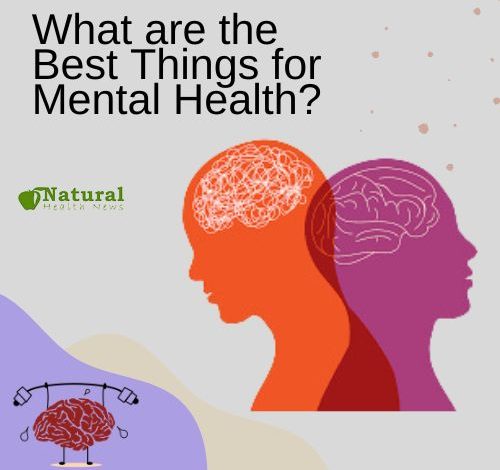What are the Best Things for Mental Health?

Mental health is a vital component of overall well-being, impacting how we think, feel, and behave in daily life. It affects our ability to handle stress, relate to others, and make choices. Prioritizing mental health is essential for maintaining a balanced and fulfilling life. The best practices and strategies to enhance mental health, with a focus on lifestyle changes, professional help, and community support.
Understanding Mental Health
What is Mental Health?
Mental health encompasses emotional, psychological, and social well-being. It influences how individuals handle stress, interact with others, and make decisions. Mental health is essential at every stage of life, from childhood through adulthood.
Importance of Mental Health
Good mental health helps individuals cope with the demands of life, build strong relationships, and recover from setbacks. Conversely, poor mental health can lead to a variety of emotional, behavioral, and physical problems.
Key Factors That Contribute to Mental Health
1. Healthy Lifestyle Choices
a. Regular Exercise
Physical activity is a powerful tool for improving mental health. Exercise releases endorphins, which are natural mood lifters. Regular physical activity can reduce symptoms of depression and anxiety, improve mood, and boost self-esteem.
b. Balanced Diet
Nutrition plays a crucial role in mental health. A diet rich in fruits, vegetables, whole grains, lean proteins, and healthy fats can improve brain function and reduce the risk of mental health disorders. Omega-3 fatty acids, found in fish, nuts, and seeds, are particularly beneficial for brain health.
c. Adequate Sleep
Sleep is vital for mental health. Lack of sleep can exacerbate mental health issues, while good sleep hygiene can improve mood, enhance cognitive function, and increase resilience to stress. Adults should aim for 7-9 hours of sleep per night.
2. Stress Management
a. Mindfulness and Meditation
Mindfulness and meditation practices can help individuals stay grounded and manage stress effectively. These practices promote relaxation, reduce anxiety, and enhance overall mental well-being.
b. Time Management
Effective time management can reduce stress and increase productivity. Prioritizing tasks, setting realistic goals, and taking regular breaks can prevent burnout and improve mental health.
3. Social Connections
a. Building Relationships
Strong social connections are crucial for mental health. Spending time with friends and family, engaging in community activities, and fostering meaningful relationships can provide emotional support and reduce feelings of isolation.
b. Seeking Support
Talking about feelings with trusted individuals can provide relief and perspective. Support groups and therapy sessions offer a safe space to share experiences and gain insights from others facing similar challenges.
Professional Help
1. Therapy and Counseling
a. Cognitive Behavioral Therapy (CBT)
CBT is a widely used therapeutic approach that helps individuals identify and change negative thought patterns and behaviors. It is effective for treating depression, anxiety, and other mental health conditions.
b. Psychotherapy
Psychotherapy involves regular sessions with a mental health professional to explore thoughts, feelings, and behaviors. It can help individuals understand and manage their mental health issues better.
2. Medication
In some cases, medication may be necessary to manage mental health conditions. Antidepressants, anti-anxiety medications, and mood stabilizers can be effective when used under the guidance of a healthcare provider.
3. Psychiatric Services
Psychiatrists are medical doctors specializing in mental health. They can diagnose mental health conditions, prescribe medication, and provide therapy. Regular consultations with a psychiatrist can ensure proper management of mental health disorders.
Community and Support Systems
1. Community Engagement
Participating in community activities can enhance a sense of belonging and purpose. Volunteering, joining clubs, or attending community events can provide opportunities for social interaction and personal growth.
2. Support Groups
Support groups offer a platform for individuals to share experiences and gain support from others facing similar challenges. These groups can provide emotional comfort, practical advice, and a sense of community.
3. Mental Health Awareness
Raising awareness about mental health can reduce stigma and encourage individuals to seek help. Educational programs, campaigns, and workshops can promote understanding and acceptance of mental health issues.
Self-Care Practices
1. Hobbies and Interests
Engaging in hobbies and activities that bring joy can improve mental health. Whether it’s painting, gardening, reading, or playing music, hobbies provide a creative outlet and a sense of accomplishment.
2. Relaxation Techniques
Practices like deep breathing, progressive muscle relaxation, and aromatherapy can promote relaxation and reduce stress. These techniques are easy to incorporate into daily routines and can significantly enhance mental well-being.
3. Gratitude and Positivity
Cultivating a positive outlook and practicing gratitude can improve mental health. Keeping a gratitude journal, expressing appreciation, and focusing on positive aspects of life can enhance overall happiness and resilience.
The Role of Technology
1. Mental Health Apps
There are numerous apps designed to support mental health. These apps offer guided meditations, mood tracking, cognitive behavioral tools, and access to professional support. They can be a convenient way to manage mental health on the go.
2. Online Therapy
Online therapy provides access to mental health professionals through virtual platforms. It offers flexibility and convenience, making it easier for individuals to seek help without the barriers of location and time.
3. Digital Detox
Excessive screen time can negatively impact mental health. A digital detox involves taking a break from electronic devices to reduce stress, improve sleep, and enhance real-life social interactions.
Mental Health in Special Populations
1. Children and Adolescents
Promoting mental health in young people involves creating supportive environments, teaching coping skills, and encouraging open communication. Schools, families, and communities play a crucial role in fostering mental well-being in children and adolescents.
2. Older Adults
Mental health is equally important in older adults. Social engagement, physical activity, and mental stimulation can help prevent cognitive decline and improve quality of life. Access to healthcare and support services is essential for addressing mental health issues in this population.
3. Individuals with Chronic Illnesses
Chronic illnesses can take a toll on mental health. Integrating mental health care into the treatment of chronic conditions can improve overall health outcomes. Support groups and counseling can provide emotional support and coping strategies.
Conclusion
Mental health is a multifaceted aspect of overall well-being that requires a holistic approach. By adopting healthy lifestyle choices, managing stress, seeking professional help, and engaging in community support, individuals can enhance their mental health and lead fulfilling lives. Prioritizing mental health not only improves individual well-being but also contributes to healthier communities and a more resilient society.




